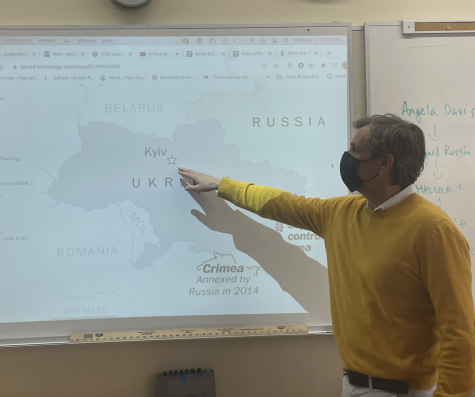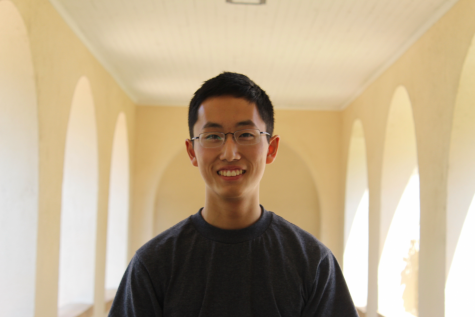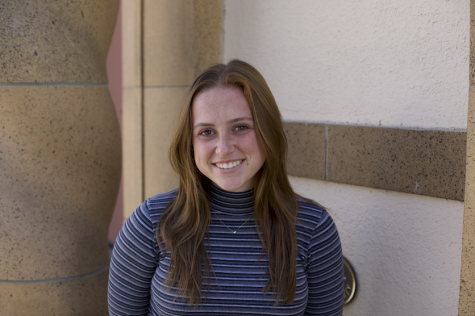Teachers reflect on Russian invasion
March 3, 2022

With Russia’s invasion of Ukraine continuing, The Paly Voice interviewed Palo Alto High School history teachers about aspects of the invasion including the threat of Russia expanding further past Ukraine, the global instability, and the possibility of the use of nuclear weapons.
Over the past couple of days, according to news outlets, Russian forces entered Ukraine from three sides, with northern forces capturing the site of Chernobyl and expanding into the capital city of Kyiv, with eastern forces capturing two areas declared by Russian President Vladimir Putin as separatist, and southern forces entering the country from the Crimean Peninsula.
World history teacher Katya Villalobos said the invasion closely mirrors historical Russian aggression.
“My students are just finishing World War 1 and they are seeing parallels between now and then in terms of nationalism and imperialism,” Villalobos said.
She added that the current crisis is a continuation of the Russian invasion and annexation of the Crimean Peninsula in 2014, and that Putin’s actions are motivated by a desire to return to the previous Soviet Union.
“You have to understand Putin is a former KGB officer … who saw the demise of the Soviet Union front and center beginning with the fall of the Berlin Wall and then the split of the USSR,” Villalobos said. “His political-economic-social world was gone.”
According to Paly economics teacher Eric Bloom, the situation is complicated by the fact that Western nations are trying to avoid direct conflict while Ukrainians want military support from the North Atlantic Treaty Organization since they can’t stop the Russians by themselves.
“They [Ukraine] are not big enough so they would need support, but I think the U.S. especially is reluctant to support with troops,” Bloom said.
According to Bloom, Putin may seek to rebuild something like the Soviet Union by taking over former Soviet states such as the Baltic States and Finland.
“Some people say, it’s the recreation of the Soviet empire, by taking over these independent states, that used to be part of the Soviet Union, and now are independent,” Bloom said.
More broadly, Adam Yonkers, who teaches US History and AP Research, said the conflict is a test between democracies and authoritarian countries.
“They have a puppet in Belarus who is very pro-Russian, so you’re starting to see that they’re testing NATO and the former countries that had broken free,” Yonkers said. “… And it’s a test for autocrats around the world there.”
For those in the US who are further from direct conflict, he said the war still threatens them through Russia’s use of cyberattacks.
“The Russians have a way of being spoilers, very disruptive,” Yonkers said. “In our 2016 election, 2020 election, you can see that they’re very effective at asymmetrical warfare.”
Yonkers added that because of this history of disinformation campaigns and Russian attacks on American democracy, the US political system has been destabilized.
“You see many people in government calling Putin a genius and saying that he’s on the right side of this,” he said. “During the Cold War, we condemned Russian actions across the aisle with bipartisanship.”
Despite the chaos in the current conflict, he said the pressures on Putin in the long term may whittle down his aggression.
“So I think in the short run, the Russians are ready to withstand the economic pressures, but in the long term, I think they [Russians] are already taking to the streets right now in defiance of Putin’s decision to invade,” he said.



